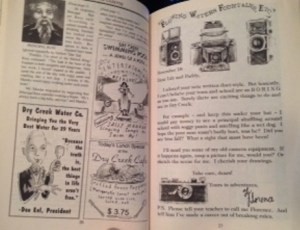This post is about the epistolary middle grade novel.
WAIT! Don’t stop reading just because that word sounds so, well, boring. And academic. Because I promise, epistolary middle grade novels are some of the most entertaining books out there!
But first, the academics: Dictionary.com defines the word epistolary [ih-pis-tl-er-ee] as an adjective meaning: of, relating to, or consisting of letters.
See? Novels made of letters! Who doesn’t love reading letters?
Actually, the epistolary middle grade novel can consist of much more. Diary entries, newspaper clippings, even advertisements can be sprinkled about, giving these novels a lighter feel and making them a visual feast. These days, we can add emails, text messages and social media posts to the list of devices used in contemporary epistolary novels.
Here’s one of my all-time faves!
That’s the cover. But, it’s the interior of the epistolary novel that is always so delicious!
Sisters Kate and Sarah Klise blend written and visual storytelling in such a fun and inviting way! Mixed fonts, lots of drawings, short snippets of this and that all contribute to this book (and to its numerous sequels that ask us to please regard other plumbing essentials, such as the sink and, yes, the privy, too).
Another great EMGN (my new acronym! Like it?) is Jennifer L. Holm and Elicia Castaldi‘s Middle School Is Worse Than Meatloaf: A Year Told Through Stuff. Believe me, the “stuff” this book is made of is way better than meatloaf!
Epistolary novels are not only entertaining to read, I’ve decided they must be a blast to write as well. Mixed-Up Files member Greg R. Fishbone recently confirmed my hunch. He told me how much fun it was writing his epistolary middle grade novel The Penguins of Doom, From the Desk of Septina Nash.
I could go on and on from Caddie Woodlawn to Diary of a Wimpy Kid. Let’s keep the list going. Add in the comments below your favorite – EMGN – Epistolary Middle-Grade Novel.
Michelle Houts is the author of four middle grade books, fiction and nonfiction. She loves getting and sending letters so much that she started the 52 Letters in a Year Challenge. So far, she has heard from letter-writers as far away as Germany and as old as 72. She hopes one day to try her hand at writing an EMGN.







